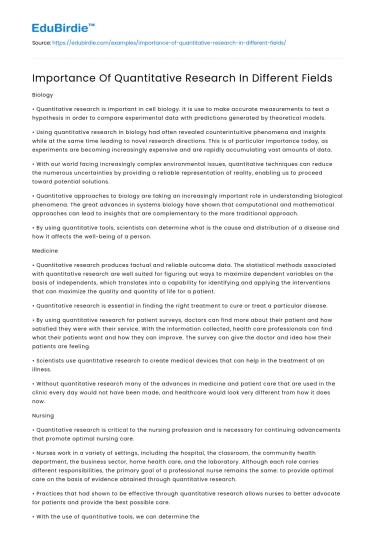Biology
• Quantitative research is important in cell biology. It is use to make accurate measurements to test a hypothesis in order to compare experimental data with predictions generated by theoretical models.
Save your time!
We can take care of your essay
- Proper editing and formatting
- Free revision, title page, and bibliography
- Flexible prices and money-back guarantee
• Using quantitative research in biology had often revealed counterintuitive phenomena and insights while at the same time leading to novel research directions. This is of particular importance today, as experiments are becoming increasingly expensive and are rapidly accumulating vast amounts of data.
• With our world facing increasingly complex environmental issues, quantitative techniques can reduce the numerous uncertainties by providing a reliable representation of reality, enabling us to proceed toward potential solutions.
• Quantitative approaches to biology are taking an increasingly important role in understanding biological phenomena. The great advances in systems biology have shown that computational and mathematical approaches can lead to insights that are complementary to the more traditional approach.
• By using quantitative tools, scientists can determine what is the cause and distribution of a disease and how it affects the well-being of a person.
Medicine
• Quantitative research produces factual and reliable outcome data. The statistical methods associated with quantitative research are well suited for figuring out ways to maximize dependent variables on the basis of independents, which translates into a capability for identifying and applying the interventions that can maximize the quality and quantity of life for a patient.
• Quantitative research is essential in finding the right treatment to cure or treat a particular disease.
• By using quantitative research for patient surveys, doctors can find more about their patient and how satisfied they were with their service. With the information collected, health care professionals can find what their patients want and how they can improve. The survey can give the doctor and idea how their patients are feeling.
• Scientists use quantitative research to create medical devices that can help in the treatment of an illness.
• Without quantitative research many of the advances in medicine and patient care that are used in the clinic every day would not have been made, and healthcare would look very different from how it does now.
Nursing
• Quantitative research is critical to the nursing profession and is necessary for continuing advancements that promote optimal nursing care.
• Nurses work in a variety of settings, including the hospital, the classroom, the community health department, the business sector, home health care, and the laboratory. Although each role carries different responsibilities, the primary goal of a professional nurse remains the same: to provide optimal care on the basis of evidence obtained through quantitative research.
• Practices that had shown to be effective through quantitative research allows nurses to better advocate for patients and provide the best possible care.
• With the use of quantitative tools, we can determine the relationship or the effect of the care provided by the nurse to the well-being or healing process of the patient.
• Nurses can provide a better and more effective care for the patients through the help of the findings of a quantitative research.
Pharmacology
• With the help of quantitative tools, researchers will be able to test the safeness of a drug or medicine and how it will affect our bodies.
• Scientists use the help of quantitative tools to study the nature of a particular drug.
• By using quantitative research, scientists can calculate the right amount of dosage of a medicine that is compatible and safe for the patient.
• With the use of quantitative research we can determine the different variables on how a person can get addicted to a certain drug.
• Scientists use quantitative tools in creating or developing a drug or medicine.
Veterinary Medicine
• Quantitative research in veterinary medicine is critical to the protection of public health and the advancement of science that benefits both humans and animals as individuals and populations.
• Quantitative research transcends species boundaries to include the study of spontaneous and experimental models of both human and animal disease and research at important human-animal interfaces, such as food safety, wildlife and ecosystem health, zoonotic diseases, and public policy.
• Quantitative methods are used in veterinary research on public health and food safety that can contribute in improving detection and surveillance of foodborne pathogens associated with livestock and poultry production and developing interventions to reduce their dissemination.
• With the use of quantitative research we can understand the development and mechanisms of antibiotic resistance among foodborne pathogens associated with animals in the food chain.
• Researchers use quantitative tools in improving our ability to detect and identify disease and pathogens in animal populations and our understanding of interactions between pathogens and hosts so that effective preventive measures and countermeasures can be developed.






 Stuck on your essay?
Stuck on your essay?

